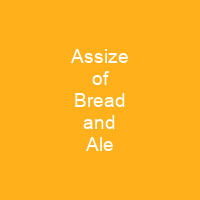The Assize of Bread and Ale regulated the price, weight and quality of the bread and beer manufactured and sold in towns, villages and hamlets. In rural areas, the statute was enforced by manorial lords, who held tri-weekly court sessions. The law was amended by the Bread Acts of 1822 and 1836, and finally repealed by the Statute Law Revision Act 1863.
About Assize of Bread and Ale in brief

An assize was originally a fixed sitting of a court or council. Under the Angevin monarchy its meaning developed to signify a law based upon \”agreed custom\”. The law can be traced back to proclamations from the reigns of Henry II and John that regulated the purchasing requirements of the royal household. These assizes adjusted the weight of bread according to the price of wheat. The assize of bread was in force until the beginning of the 19th century, and was only then abolished in London.
You want to know more about Assize of Bread and Ale?
This page is based on the article Assize of Bread and Ale published in Wikipedia (as of Jan. 23, 2021) and was automatically summarized using artificial intelligence.







